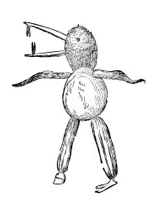Hot Fruit
Erinrose Mager
It took me until after my father's war, which wasn't his war, to know where to go, and by then he had died, and I was all-the-time moving through doors and into gardens to look into the light and then moving through gardens to look toward a road and then walking after nightfall, until daybreak, toward a vanishing point, and so forth. I'm here now.
I run the edge of my little clam shell mirror up a fruit's seam. I lick my hands, the mirror, drag my bottom teeth up the rind.
Sometimes I don't know where the ledge falls off. I sneak the little clam shell mirror around the corners, tilt it down to catch a steep one. Through the mirror: at the bottom of a ravine, a sea of slow-moving nacre or a sweet string of dark houses. A faraway light in a valley, at times, turns on and then off.
Well, I couldn't have known.
He'd been sitting at the table, looking at me. I was a baby.
He said, She never laughs.
My mother said, She's observant.
He said, Me? I laugh all the time.
My mother said, I've never known what about.
He laced up his boots, scattered green peas into the garbage. I'm tricky like that, he said.
The python's integument stretches to accommodate any prey—the skin's cell structures warp, the organs move over, the dead animal slides down and within the length of the snake for storage. It's these facts that I've learned within the course of a life. I must say that I'm unflagging in my interests if these interests allow for solitude.
I'm not hungry right now.
My hands, the mirror, the skin around my mouth are tacky. I nurse the fruits when I discover them along the way. They're hot and bloated from exposure.
I didn't find him slumped, my father—he was hundreds of miles away in a soft chair I'd never seen, and I was mounting a summit or trying to—but I know this much to be true: I'll never close a man's eyelids with my own two fingertips because that is a death ritual, and I have limits. I wouldn't, for instance, paint a portrait and call it the best I've ever done. I wouldn't, for instance, assume I understand the science behind the phenomena that I love.
Here is a furred spot rotten on the path, once a squirrel who'd readied for winter, and I dodge it like a dancer, which is to say that I point my toes and feel a litheness right there in the road. My itinerant thoughts—I encounter them in any stranger who looks like I do.
I unpocket the mirror, feel the ribs of its shell, open it. I could use it for anything. I could angle it toward a heron or a machine that plays music. I guess that's invention. That's the opposite of devotion.



